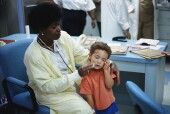Local Care of Child Pneumonia Studied in Developing World
Allowing local health facilities in developing countries to treat children with severe pneumonia rather than referring them to hospitals results in better disease management and fewer deaths, according to a report published online Aug. 19 in The Lancet.

TUESDAY, Aug. 19 (HealthDay News) -- Allowing local health facilities in developing countries to treat children with severe pneumonia rather than referring them to hospitals results in better disease management and fewer deaths, according to a report published online Aug. 19 in The Lancet.
Enayet K. Chowdhury, from the International Centre for Diarrhoeal Disease Research in Dhaka, Bangladesh, and colleagues examined outcomes after implementation of a modified form of the Integrated Management of Childhood Illness (IMCI) guidelines for severe pneumonia, having children be treated locally in first-level facilities instead of being referred to hospitals. The study examined 261 children treated based on the original guidelines and 1,271 children treated based on the modified guidelines (all 2 months to 59 months old).
The researchers found that after implementation of the modified guidelines, considerably fewer children were referred to the hospital (8 percent versus 94 percent), considerably more children received correct disease management (90 percent versus 36 percent) and fewer children died (0.6 versus 1.1 percent, though this was not statistically significant).
"Local adaptation of the IMCI guidelines, with appropriate training and supervision, could allow safe and effective management of severe pneumonia, especially if compliance with referral is difficult because of geographic, financial or cultural barriers," Chowdhury and colleagues conclude.
AbstractFull Text (subscription or payment may be required)Editorial
Copyright © 2008 ScoutNews, LLC. All rights reserved.